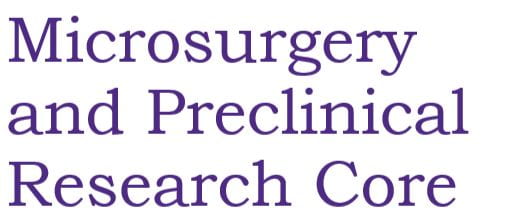About Us:
The Core was launched in 2009 at the same time the Comprehensive Transplant Center (CTC) was founded in the Feinberg School of Medicine. The Core began with one surgeon and one surgical microscope supporting two investigators in the Division of Transplantation. The initial seed funding was provided to support expansion in terms of both surgeons and scopes. In parallel, several strategies were implemented to increase awareness about the Core to members of the CTC and NU research community through newsletters, stakeholder meetings and the CTC website. Dr. Zheng Zhang has served as the director of Microsurgery Core since its inception. Dr. Zhang, a transplant surgeon, was recruited as a research assistant professor by Northwestern University (NU) in 1998. As an expert in the field of experimental microsurgery and transplant immunology, Dr. Zhang’s research has been centered in developing small animal models to address critical questions involving transplant rejection, tissue injury and inflammation. She has published more than eighty peer-reviewed articles in the areas of transplant immunology, tissue injury and inflammation, as well as microsurgical techniques. Under Dr Zhang’s leadership, the Core has noticeably expanded laboratory space with additional equipment and increased service portfolios. Currently, the Core occupies approximately 1000 square feet of space that houses four microsurgery operating units with four Zeiss operating microscopes, a cell isolation facility and a satellite animal facility. The Core acquired two state of art blood bio-analyzers 4 years ago, which have allowed the Core to provide multiple peri-operative blood chemistry testing, e.g. renal and liver panels and hematology testing for preclinical research. The Core currently supports 25+ investigators/projects across disciplines, departments at NU and other academic institutions with 35 service categories. On average, the Core performs 1000+ microsurgical procedures and more than 2000 other lab procedures including cell isolation (bone marrow cells, islets), drug deliveries, and necropsies annually. Taken together, with the support from CTC, the Core has evolved as a central resource that not only provides microsurgical expertise but also offers comprehensive lab tests for preclinical research.
The Core has been recruiting and training multiple microvascular surgeons on a rolling basis to meet the needs of investigators. The team is currently composed of four staff who are well trained for microsurgical skills and peri-operative animal care leading to excellent survival outcomes. The data obtained from use of our services have generated numerous publications and presentations at national and international scientific conferences and have helped to attract external funding. The Core also provides training for students and fellows at all levels, and has been instrumental in helping recruit talented faculty with research programs that require these services.
The strengths of the Core are four-folds: 1) its decades of rodent-based research experience and expertise in creating innovative murine surgical models, especially vascularized organ transplant models in mice; 2) its passionate, hard-working, skillful and collegial staff; 3) state–of–art equipment and flexible scheduling; and 4) outstanding administrative support from CTC. The Core’s productivity is reflected by multiple publications in peer-reviewed scientific journals, and numerous abstracts being presented or to be presented in national and international conferences within one year. In addition to providing technical services, we have also provided consultations to PIs on experiment design, outcome discussion and data interpretation, and new model development. The Core has supported multiple external funding for frontier research in transplantation, immunology, regenerative medicine and bioengineering, through multiple productive collaborations cross the different department in NU. The Core has participated in the annual user survey over the last seven consecutive years and has achieved high level of user satisfaction with ratings above average in the NU‑FSM annual user survey over the last six consecutive years. The Core was considered “A unique and important resource. Very high user satisfaction. Cost-effective for such complex services,” by the FSM Research Cores Committee at FSM FY-21 annual review. Below are highlights of the Core’s activities.
Support
The core supports PIs from different departments and areas across the two NU campuses, as well as multiple NIH grants (R01s, P01), AHA, and private foundations.
Experience
The Core has over 10 years of experience working with external academic institutions and other industries.
Services
On average, the Core performs ~1000 microsurgical procedures (heart/kidney/lung/VCL transplants, IRI) and ~1000 other lab procedures (drug deliveries, cell isolation and blood chemistry analyses) per year.
Research
The Core has a number of grant applications and many peer-reviewed publications (see bibliography).
Presentations
The Core has many presentations at national and international conferences such as ATC, IHW, ASN Kidney Week, and Liver Meeting.
Awards
Most recently, the Core was a winner of the 2020 Simpson Querrey Institute’s Core Facilities Service Excellence Award.
The Microsurgery and Preclinical Research Core is located on the 11th floor of Tarry in Northwestern University Feinberg School of Medicine. The facility holds a murine intensive care unit for postoperative animals to recover from surgery as well as other separate areas designated for animal prep, drug delivery, necropsy and tissue sampling.
The facility consists of a surgical suite along with a satellite animal holding suite for peri-operative animal care. The surgical suite is equipped by state-of-the-art operating microscopes including three Zeiss OPMI® operating microscopes with dual binocular heads and two Zeiss Stereo Zoom Microscopes (STEMI SV6) with five aseptic surgical units. In addition, there are two Abaxis VetScan bioanalyzers available for blood chemistry and diagnostic tests.
